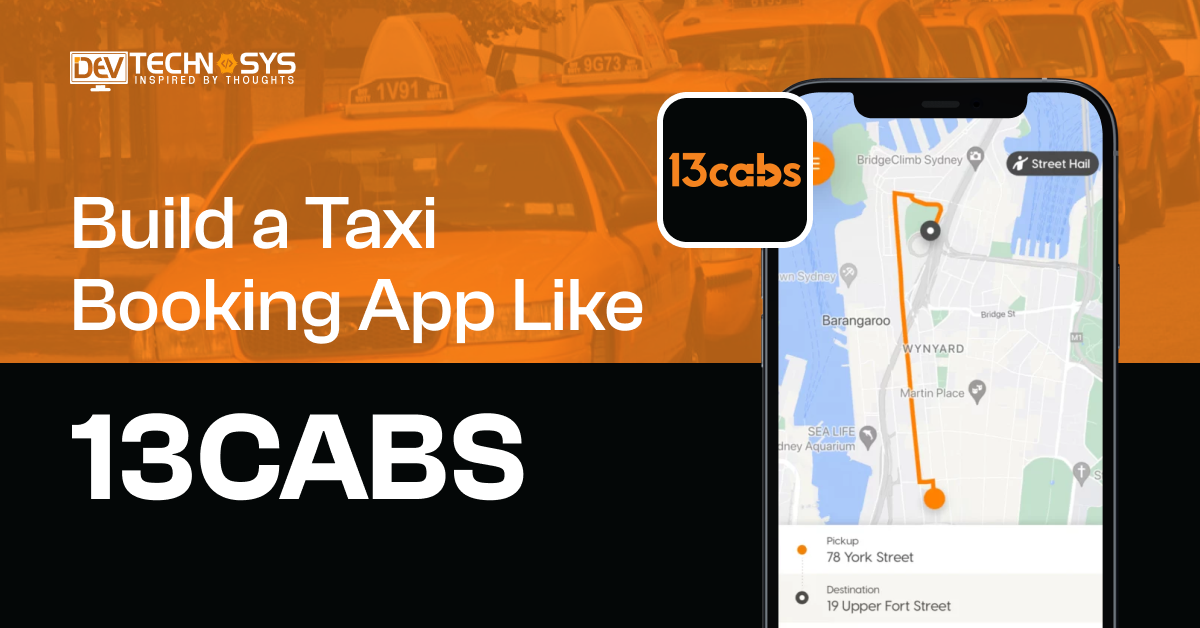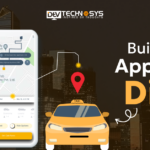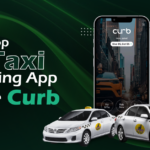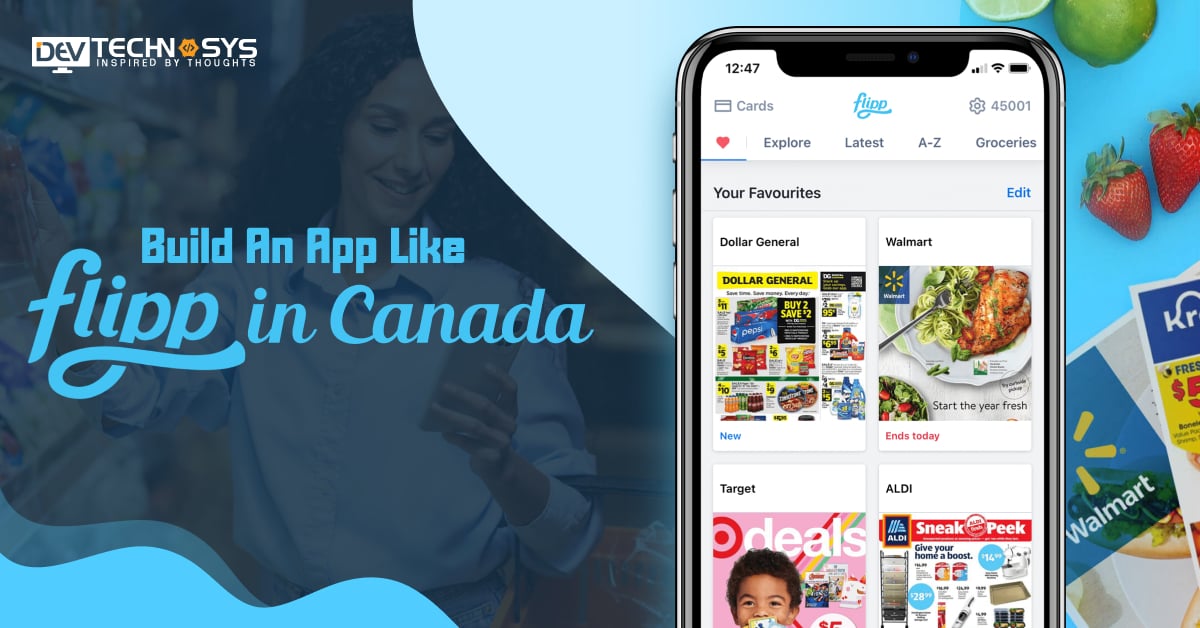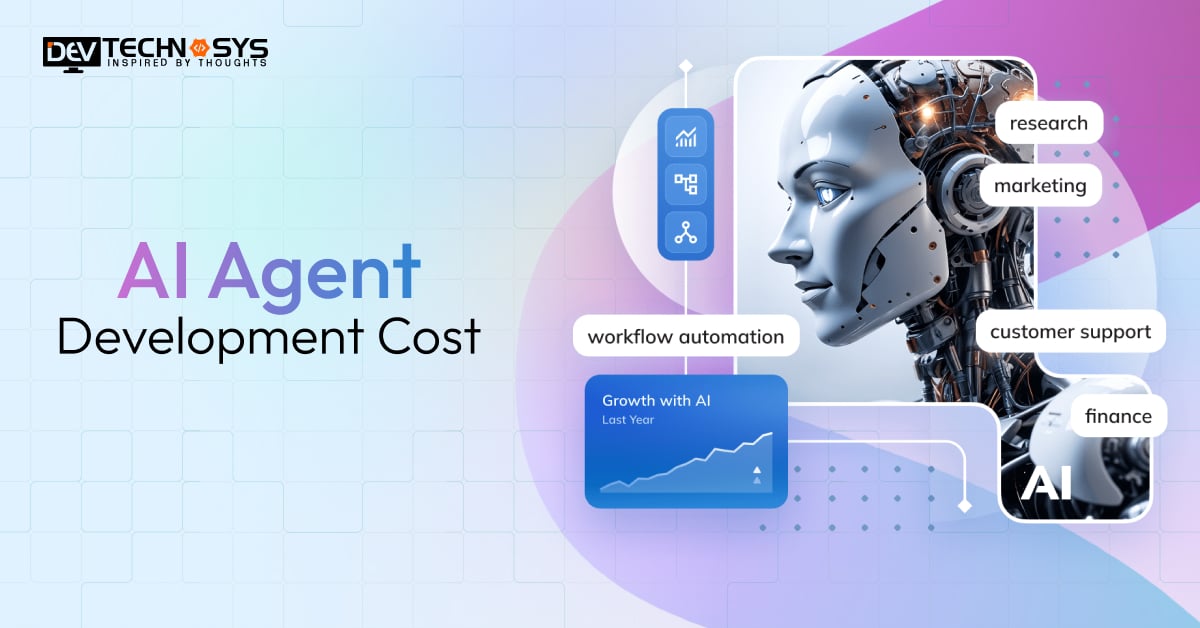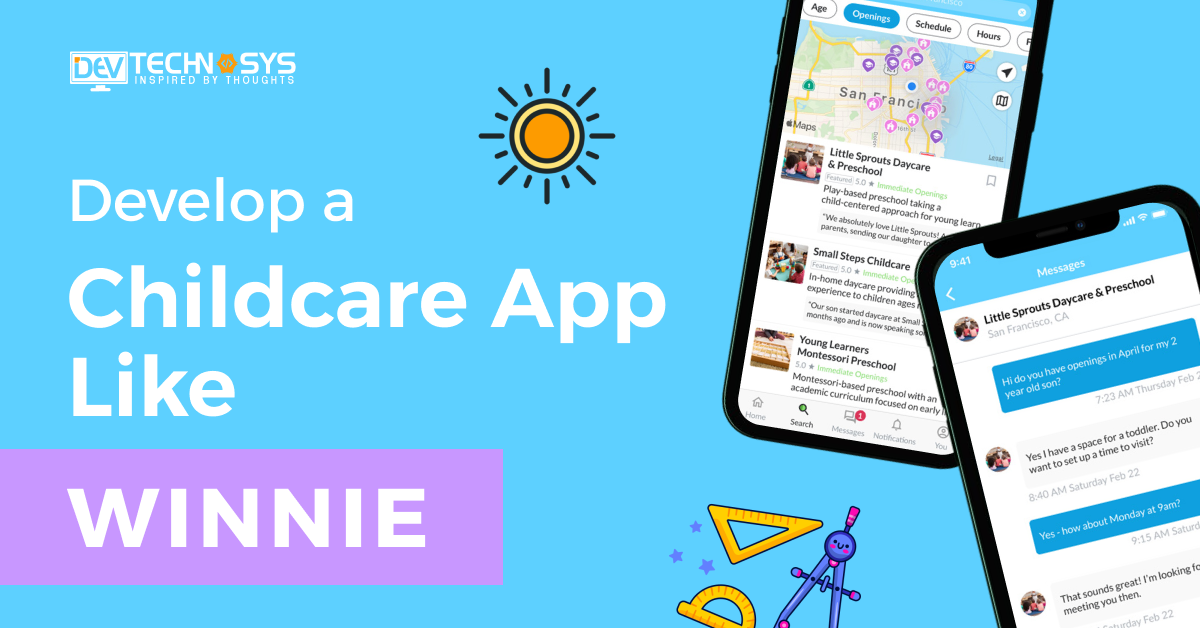In today’s fast-moving world, taxi booking apps like 13cabs have made traveling easier, faster, and more comfortable.
With just a few taps on your phone, you can book a ride anytime, anywhere.
Have you ever wondered how these amazing apps are made?
Building a taxi booking app may sound complicated, but with the right plan and tools, it’s totally possible, even exciting!
Key takeaways:
-
- The global ride-hailing market was valued at USD 120 billion in 2024 and is expected to grow significantly by 2033.
- 13cabs’ success highlights the value of reliable service, accessibility, and user-friendly technology.
- Core features include real-time booking, GPS tracking, secure payments, driver management, and customer support.
- Apps like 13cabs, Uber, and Lyft provide efficient, safe, and convenient transportation through advanced mobile platforms.
Just like how 13cabs connects drivers and passengers, your app can do the same by using smart features like GPS tracking, online payments, and real-time updates.
In this blog, we will explore step-by-step how to build a taxi booking app like 13cabs.
Whether you’re an entrepreneur curious about technology or someone who dreams of creating an app, this guide will help you understand how it all works.
Let’s take the ride into app development and create something truly helpful and awesome!
Market Analysis of Global Taxi Booking Applications
- It is projected that the global taxi industry will bring in US$138.58 billion by 2025.
- The taxi business is expected to have 973.70 million consumers by 2030, according to projections.
- The potential value that each user in the taxi sector may create is shown by the estimated average revenue per user (ARPU), which is US$126.89.
- China is predicted to provide the most income in the taxi industry globally, with an anticipated revenue of US$53 billion in 2025.
- In many developing nations throughout the world, conventional taxis continue to be the most popular form of transportation for both locals and visitors, even in the face of the growth of ride-hailing services.
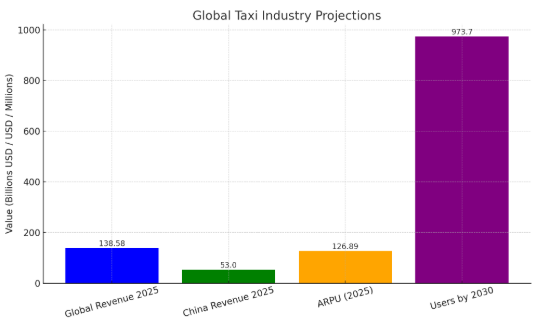
What is 13cabs?
The 13cabs app provides a mobile booking platform for Australia’s largest taxi network. Users may order trips 24/7, including taxis, maxi-taxis, SUVs, and wheelchair-accessible cars. To ensure safety and convenience, the best taxi booking apps like 13cabs provide upfront rates, secure payment options, and live trip monitoring. Business account management, fare splitting, pet-friendly alternatives, and real-time notifications provide smooth and dependable urban and regional travel.
User Case Study: 13cabs
- 13cabs introduced its iPhone app in March 2010, pioneering GPS‑based cab booking, fare estimates, and “Where’s My Cab?” tracking functionality.
- In October 2010, they launched a world‑first Facebook booking app, enabling seamless cab reservations without leaving social media.
- By January 2011, app updates supported favourites, deferred bookings, Rank finder, trip history, enhancing convenience, and user retention.
- Partnered with JOLT and councils to install EV chargers at depots and taxi ranks, addressing charging infrastructure shortfalls.
- As part of A2B Australia (formerly Cabcharge), 13cabs commands Australia’s largest taxi network with over 10,000 vehicles.
- Facilitated more than eight million trips in 2019 supporting passengers with disabilities, reinforcing inclusive service commitment.
Different Types of Taxi Booking Apps
Discover how taxi apps vary, including aggregator platforms, dedicated fleet services, and ride-sharing models, each offering unique benefits, pricing, and features to suit modern urban transportation needs.
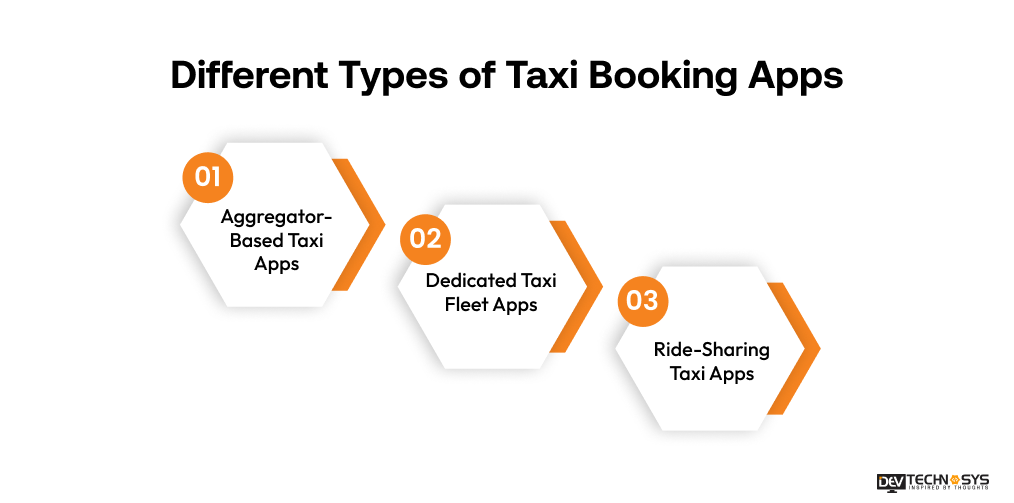
1. Aggregator-Based Taxi Apps
Aggregator applications link users to many cab operators through a single platform. They do not own automobiles, but instead serve as brokers, providing pricing comparisons, availability, and booking ease. Examples include Uber and Ola.
2. Dedicated Taxi Fleet Apps
These taxi app solutions are run by specialized taxi businesses that manage their own fleet and drivers. Customers book directly with the service provider, which ensures brand consistency and improved quality control. Examples are Blacklane and 13cabs.
3. Ride-Sharing Taxi Apps
Ride-sharing applications allow private car owners to provide trips for a fee, frequently using real-time demand algorithms. They allow for carpooling or solitary travel and may avoid regular taxi rules. Examples are the Lyft Line and BlaBlaCar.
10 Best Taxi Booking Apps
Explore the top taxi booking apps offering reliable rides, user-friendly features, wide availability, and seamless payment options to make urban travel faster, safer, and more convenient worldwide.
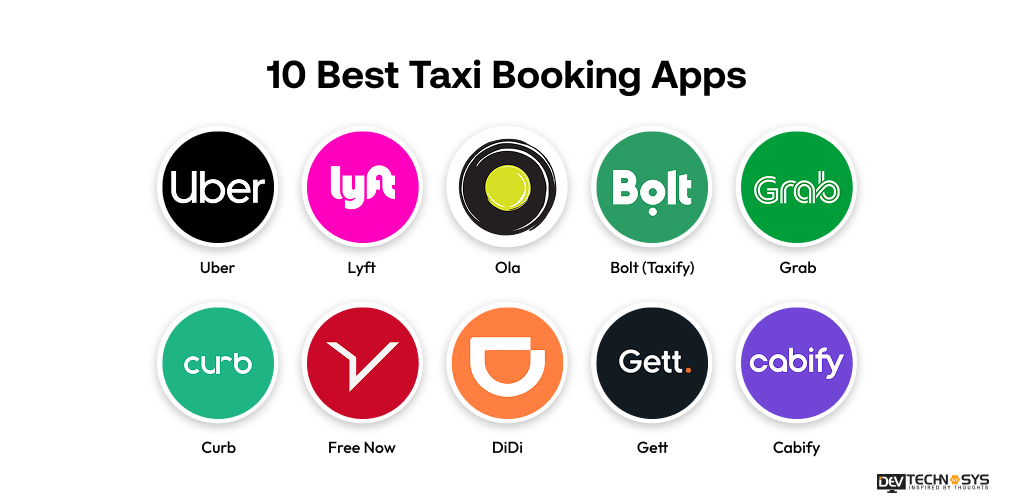
| App Name | Estimated Downloads | Average Rating | Launched Year | Platform Availability |
| Uber | 1B+ | 4.2 ★ | 2009 | Android, iOS |
| Lyft | 100M+ | 4.0 ★ | 2012 | Android, iOS (US & Canada) |
| Ola | 500M+ | 4.1 ★ | 2010 | Android, iOS (India, others) |
| Bolt (Taxify) | 100M+ | 4.5 ★ | 2013 | Android, iOS (Europe, Africa) |
| Grab | 200M+ | 4.3 ★ | 2012 | Android, iOS (SE Asia) |
| Curb | 10M+ | 4.0 ★ | 2007 | Android, iOS (US only) |
| Free Now | 50M+ | 4.2 ★ | 2009 | Android, iOS (Europe) |
| DiDi | 500M+ | 4.6 ★ | 2012 | Android, iOS (Global/Asia) |
| Gett | 10M+ | 4.1 ★ | 2010 | Android, iOS (Europe, US) |
| Cabify | 10M+ | 3.4 ★ | 2011 | Android, iOS |
Why Businesses Want to Invest in Taxi Booking App Development?
In today’s fast-paced digital world, businesses increasingly recognize the value of investing in car rental software development. These apps revolutionize transportation by offering convenience, efficiency, and profitability. Here are five compelling reasons why businesses are eager to enter this space:
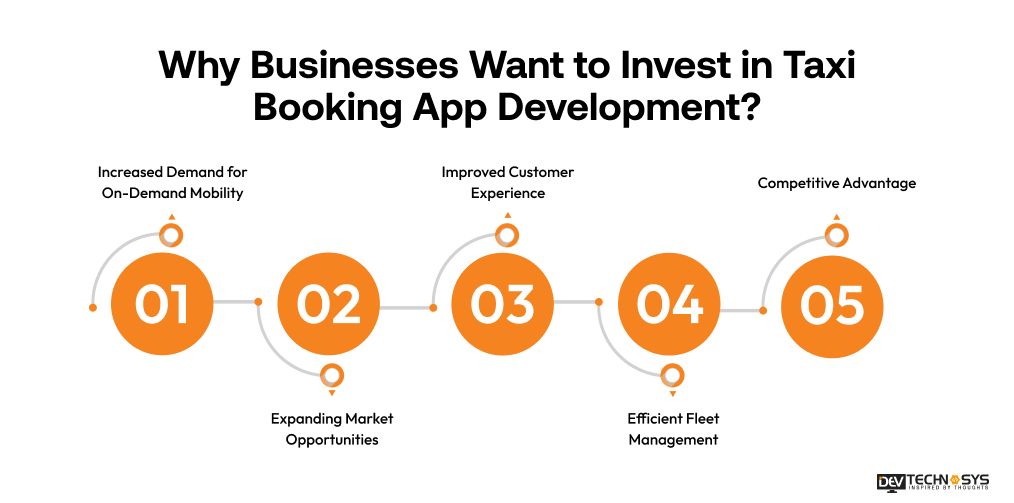
1. Increased Demand for On-Demand Mobility
Consumers want immediate and hassle-free transportation options. Taxi booking mobile applications meet this need by offering real-time cab bookings, simple fare estimations, and convenient payment methods. This simplicity attracts more users, which boosts app engagement and income.
2. Expanding Market Opportunities
The worldwide ride-hailing sector is expanding quickly, fueled by urbanization and smartphone adoption. Businesses that make a taxi booking app like 13cabs have access to a rich industry that spans cities throughout the world. This growth potential makes app development a viable long-term investment.
3. Improved Customer Experience
Taxi applications use features like GPS monitoring, driver ratings, and numerous payment channels to increase service transparency and consumer happiness. Customers who are satisfied are more likely to return, which helps firms create loyalty and gain a competitive advantage.
4. Efficient Fleet Management
The car rental apps like Turo provide tools to manage bookings, optimize routes, and monitor driver performance in real time. This efficiency reduces operational costs and maximizes fleet utilization. Additionally, features like driver incentives and support platforms enhance driver retention and motivation.
5. Competitive Advantage
Businesses that invest in taxi app development use modern technology such as AI, machine learning, and data analytics. These technologies offer smarter pricing, demand prediction, and tailored marketing, helping businesses to remain ahead of the competition in a rapidly changing market.
How AI Can Improve the Operations of Taxi Booking Apps?
- AI enables dynamic pricing by analyzing demand, traffic, and weather, optimizing fares to balance driver earnings and passenger affordability efficiently.
- Predictive analytics forecast peak times and locations, allowing better driver allocation and reducing passenger wait times for quicker, more reliable service.
- AI-powered route optimization suggests fastest, least congested paths, saving fuel, reducing travel time, and improving overall customer satisfaction and driver productivity.
- Automated customer support chatbots handle common queries instantly, freeing human agents for complex issues and providing 24/7 assistance to users.
- Machine learning algorithms analyze ride patterns to detect fraudulent activities, ensuring safer transactions and protecting both drivers and passengers effectively.
7 Robust Steps to Build a Taxi Booking App Like 13cabs
Build a reliable and user-friendly taxi booking app like 13cabs by integrating essential features such as real-time tracking, secure payments, driver management, and an intuitive design. Leverage modern technology and a strategic approach to capture the growing ride-hailing market successfully. Understand the step-by-step guide of the taxi booking mobile app development process:
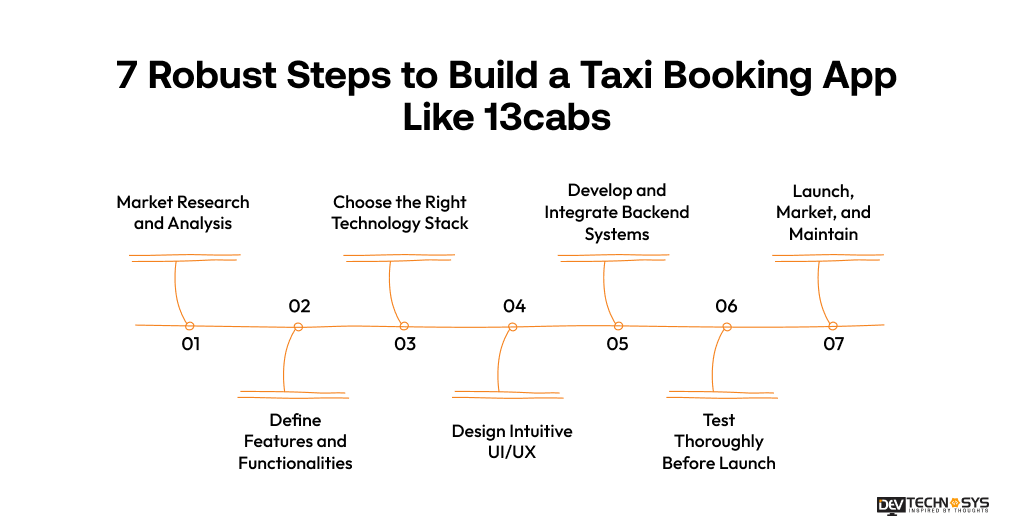
1. Market Research and Analysis
Start by studying the taxi app market, target audience, competitors, and regional regulations. Identify user pain points and gaps to craft a unique value proposition.
Hire mobile app developers to understand local transport laws and driver requirements to ensure compliance. This foundational research guides your app’s feature set, design, and business strategy for long-term success.
2. Define Features and Functionalities
In the second stage to create an app like 13cabs, outline essential features like real-time ride booking, GPS tracking, payments, driver profiles, ratings, and scheduling. Decide on advanced options like surge pricing, corporate accounts, and accessibility features.
Prioritize features based on user needs and budget, ensuring the app balances simplicity with functionality to attract and retain riders and drivers.
3. Choose the Right Technology Stack
In the third stage to build an app like 13cabs, select technologies suitable for scalability, performance, and cross-platform support. Popular frontend options include React Native or Flutter for mobile apps, while Node.js or Django are ideal for backend development.
Hire dedicated developers to integrate APIs for maps, payments, and notifications. The right tech stack ensures smooth app performance and faster time-to-market.
4. Design Intuitive UI/UX
Create a user-friendly, visually appealing interface for both riders and drivers. Focus on simple navigation, clear call-to-actions, and accessibility. Incorporate branding elements consistently. Perform usability testing to gather feedback and iterate. An intuitive design reduces user friction, enhances engagement, and increases app adoption.
5. Develop and Integrate Backend Systems
Build a robust backend infrastructure to manage user data, bookings, payments, and real-time communication. Hire expert coders from a mobile app development company to ensure security protocols, scalable architecture, and API integrations for maps and payment gateways.
The backend powers essential functionalities like driver matching, fare calculations, and notifications, providing a reliable experience for all users.
6. Test Thoroughly Before Launch
Moving to the sixth stage to develop an app like 13cabs, conduct rigorous testing, including functional, performance, security, and usability tests. Identify and fix bugs, ensure compatibility across devices and platforms, and simulate real-world scenarios.
Quality assurance guarantees a smooth, secure user experience, minimizes crashes, and builds trust in your app before it reaches the market.
7. Launch, Market, and Maintain
Consult with an Android app development company to deploy the app on app stores with a strategic marketing campaign targeting riders and drivers. Collect user feedback and analyze app metrics to guide updates. Regular maintenance, security patches, and feature enhancements keep the app competitive, secure, and aligned with evolving user expectations.
Why Do Users Choose 13cabs Above Other Taxi Booking Apps?
Discover why 13cabs stands out with its reliable fleet, accessibility, flexible payments, strong safety protocols, and dedicated customer support, making it Australia’s trusted taxi booking choice.
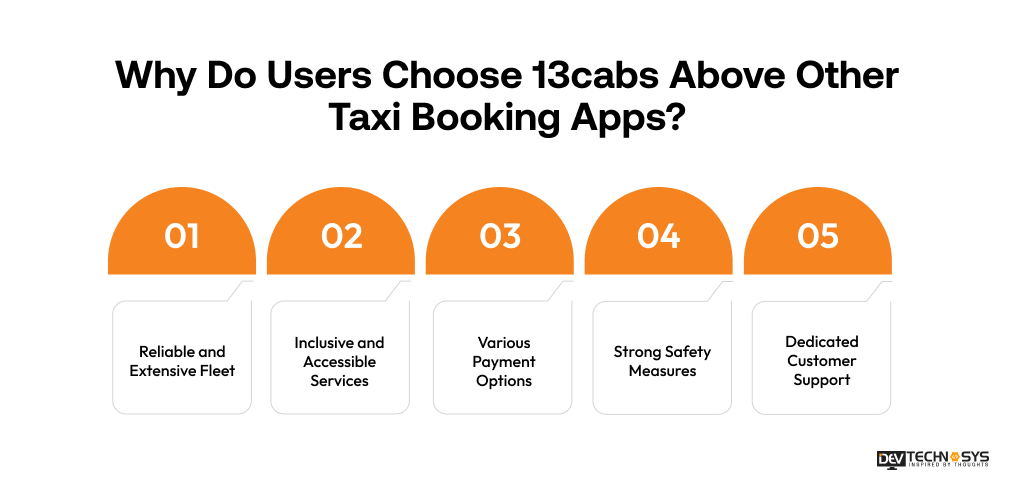
1. Reliable and Extensive Fleet
13cabs operates one of Australia’s largest taxi fleets, providing availability in all cities and areas. Users trust the brand to provide prompt pickups and consistent service, resulting in shorter wait times as compared to smaller or ride-sharing rivals.
2. Inclusive and Accessible Services
The app like Uber and 13cabs provides wheelchair-accessible cars and assists people with impairments. This dedication to accessibility makes 13cabs a top choice for those who want particular transportation alternatives that many other applications may not provide.
3. Various Payment Options
13cabs accepts a variety of payment options, including cash, credit, digital wallet, and account billing. This flexibility caters to all user preferences, increasing ease and making it easier for clients to pay easily.
4. Strong Safety Measures
The firm promotes passenger and driver safety with frequent vehicle sanitization, driver background checks, and contactless booking choices. These approaches increase trust and confidence, which is especially crucial during and after the epidemic.
5. Dedicated Customer Support
With 24/7 customer support and extensive knowledge of Australian locations, 13cabs provides customized help and rapid problem resolution, resulting in a more seamless experience than other overseas or less localized taxi applications.
10 Basic and Premium Features of Taxi Booking Apps Like 13cabs
A taxi booking application solution, such as 13cabs, combines technology and convenience to transform how people travel. These apps integrate essential features designed to provide seamless, safe, and efficient rides for users. Here are ten key features commonly found in apps like 13cabs:
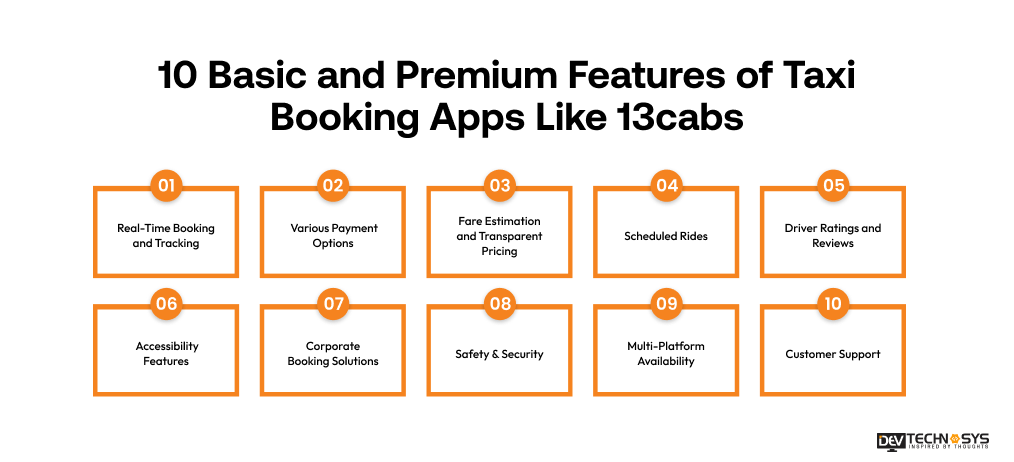
1. Real-Time Booking and Tracking
13cabs alternatives allow users to order cabs instantly and track their driver’s whereabouts in real-time, increasing transparency and minimizing wait times.
2. Various Payment Options
An app like Bolt accepts a variety of payment options, including credit/debit cards, cash, digital wallets, and corporate accounts, providing greater customer freedom.
3. Fare Estimation and Transparent Pricing
Customers receive fare estimations based on distance, time, and traffic conditions prior to booking, avoiding unpleasant surprises after the journey.
4. Scheduled Rides
13cabs clone app allows passengers to schedule trips hours or days in advance, making it convenient for airport transfers or essential appointments.
5. Driver Ratings and Reviews
Users may evaluate drivers and submit comments, encouraging high service standards and responsibility in the driving community.
6. Accessibility Features
Similar apps like 13cabs offer wheelchair-accessible vehicles and extra support for people with impairments.
7. Corporate Booking Solutions
13cabs clone app simplifies employee travel by providing consolidated accounting, reporting, and priority reservations customized to business requirements.
8. Safety & Security
Taxi booking app like Gett offers features such as driver background checks, in-app SOS buttons, and trip sharing, which enhance passenger safety throughout the route.
9. Multi-Platform Availability
13cabs alternatives are available on Android and iOS devices, as well as through online or phone bookings, guaranteeing a broad user base.
10. Customer Support
Similar apps like 13cabs provide 24/7 in-app customer service and support centers that promptly resolve booking issues or emergencies, enhancing trust and reliability.
The Cost to Build a Taxi Booking App Like 13cabs
The cost to develop a taxi booking app like 13cabs lies between $8,000 and $25,000, depending on features, platform (iOS, Android, or both), and complexity. Key cost factors include real-time GPS tracking, payment gateway integration, user and driver profiles, scheduling, and customer support.
Custom design, backend infrastructure, and security measures also impact the cost to develop a taxi app. Ongoing maintenance and updates add to costs. Partnering with experienced developers ensures quality, scalability, and compliance with local regulations, maximizing your app’s success potential.
| Component | Estimated Cost (USD) | Description |
| App Design & UI/UX | $5,000 – $15,000 | User-friendly design for passengers and drivers |
| GPS Tracking & Booking | $10,000 – $13,000 | Real-time location tracking and ride booking features |
| Payment Integration | $5,000 – $8,000 | Secure payment gateways and options |
| Admin Panel & Management | $8,000 – $14,000 | Backend dashboard to manage users and rides |
| Testing & Maintenance | $5,000 – $7,000 (annual) | Quality assurance and ongoing app support |
Total Development Cost: $8,000 – $25,000+
What Are the Key Factors That Impact the Taxi Booking App Development Cost?
Discover how app features, platform choice, design quality, backend complexity, and ongoing maintenance collectively impact the overall cost to build a taxi booking app like 13cabs tailored to meet user needs and business goals.
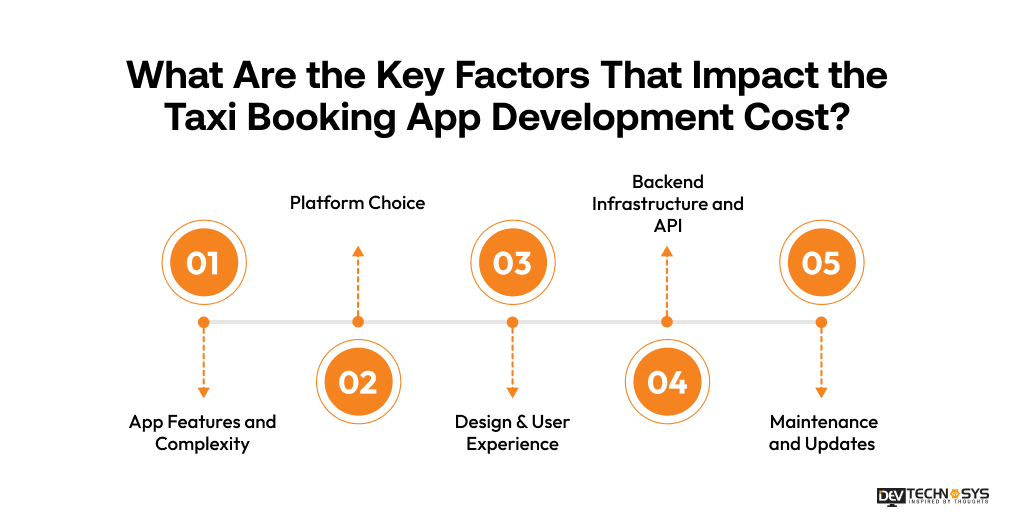
1. App Features and Complexity
The amount and sophistication of features considerably influence pricing. Basic applications with basic booking and payment are less expensive, however complex features like as real-time tracking, dynamic pricing, multi-language support, and AI integration demand more development time and resources, raising the total car rental app development cost.
| Feature Type | Estimated Cost (USD) | Description |
| Basic Booking & Payments | $5,000 – $10,000 | Simple ride booking and payment |
| Real-Time GPS Tracking | $10,000 – $20,000 | Live location updates and tracking |
| Advanced Features (AI, chatbots) | $15,000 – $30,000 | AI-powered and automation features |
| Multi-language Support | $3,000 – $7,000 | Localization for global audiences |
2. Platform Choice
Developing for a single platform (iOS or Android) is less expensive than designing for both. Cross-platform programs may save money, but they may not function well. Native applications give a superior user experience, but they demand distinct development processes, which affects the taxi booking app development cost.
| Platform | Estimated Cost (USD) | Description |
| Android Only | $10,000 – $20,000 | Development for Android devices |
| iOS Only | $13,000 – $22,000 | Development for iOS devices |
| Both Platforms (Native) | $15,000 – $23,000 | Separate native apps for both |
| Cross-Platform | $16,000 – $25,000 | Single app for both platforms |
3. Design & User Experience
A clear, intuitive UI/UX design necessitates competent designers and iterative testing. Custom animations, branding, and accessibility features increase complexity and time. Higher design standards immediately raise car pool app development cost while improving user happiness and retention.
| Design Element | Estimated Cost (USD) | Description |
| Basic UI/UX Design | $5,000 – $10,000 | Simple, clean interfaces |
| Custom Animations | $3,000 – $7,000 | Interactive visual effects |
| Accessibility Features | $2,000 – $5,000 | Features for users with disabilities |
| Branding and Customization | $4,000 – $8,000 | Unique brand identity design |
4. Backend Infrastructure and API
Robust backend systems maintain data, authenticate users, and integrate with third-party services such as maps or payment gateways. Creating a scalable, secure backend requires a substantial amount of time and money, especially when aiming for high availability and seamless performance. These can increase the 13cabs app development cost and time.
| Backend Component | Estimated Cost (USD) | Description |
| User Authentication | $5,000 – $10,000 | Secure login and user management |
| Payment Gateway Integration | $5,000 – $12,000 | Handling payments securely |
| Real-Time Data Processing | $8,000 – $15,000 | Managing GPS and ride data |
| Third-Party API Integration | $3,000 – $7,000 | Maps, notifications, analytics |
5. Maintenance and Updates
Taxi booking app maintenance services include bug repairs, security updates, feature upgrades, and adaptation to OS changes. Regular maintenance contracts increase 13cabs app development cost while ensuring app durability, dependability, and compliance with changing user demands and market trends.
| Maintenance Task | Estimated Annual Cost (USD) | Description |
| Bug Fixes & Patches | $5,000 – $10,000 | Regular updates to fix issues |
| Security Updates | $3,000 – $6,000 | Ensuring app security compliance |
| Feature Enhancements | $7,000 – $12,000 | Adding new features and improvements |
| OS Compatibility Updates | $3,000 – $6,000 | Adapting to Android/iOS changes |
Modern Tech Stacks to Build a Taxi Booking App Like 13cabs
| Development Layer | Technology/Tool | Purpose/Function |
| Frontend (User Interface) | React Native / Flutter | Cross-platform mobile app development (iOS and Android) |
| Swift (iOS), Kotlin (Android) | Native mobile app development | |
| Backend (Server-Side) | Node.js / Express.js | Handles APIs, business logic, and server requests |
| Django / Python | Robust backend framework for scalable apps | |
| Database | PostgreSQL / MySQL | Stores user, trip, payment, and ride data |
| MongoDB | NoSQL alternative for flexible, scalable data storage | |
| Real-Time Features | Firebase / Socket.IO | Enables live location tracking and real-time updates |
| Maps & Navigation | Google Maps API / Mapbox | Provides GPS, geolocation, directions, and ETA calculations |
| Payment Gateway | Stripe / PayPal / Razorpay | Secure online payments and wallet integrations |
| Push Notifications | Firebase Cloud Messaging (FCM) | Sends alerts for booking updates and driver arrival |
| Authentication | OAuth 2.0 / Firebase Auth | Manages secure user logins and sessions |
How to Generate Revenue From Taxi Booking Apps Like 13cabs?
Online taxi booking applications are not just about transportation; they’re powerful platforms with multiple monetization opportunities. Here are five proven ways to generate revenue from apps like 13cabs:
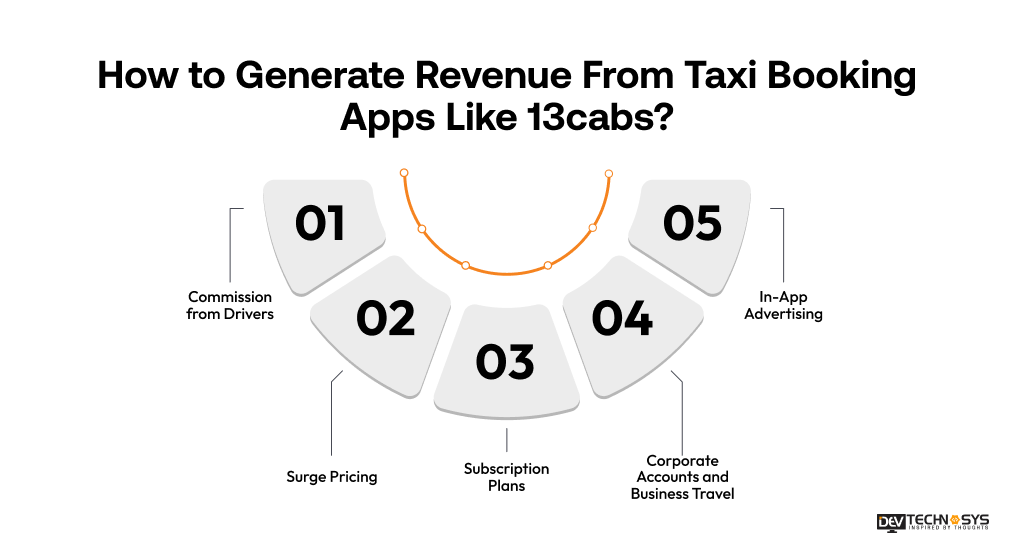
1. Commission from Drivers
One of the most prevalent income strategies involves charging drivers a percentage fee for each completed journey. The software serves as a marketplace for customers and drivers, with drivers paying a service charge ranging from 10% to 30% of the cost.
2. Surge Pricing
13cabs like taxi booking apps prices may rise automatically at peak hours, in inclement weather, or in high-demand conditions. This surge pricing helps the platform by raising income per trip and motivating more drivers to be available during peak demand periods.
3. Subscription Plans
If businesses create a mobile app like 13cabs, it provides premium membership packages to drivers, which include perks such as decreased commission rates, priority trip assignments, and access to analytics tools. These recurring plans generate predictable revenue while increasing driver loyalty.
4. Corporate Accounts and Business Travel
Providing personalized solutions to corporations for employee travel may be a lucrative income source. Companies may be invoiced monthly for employee rides, and they have access to consolidated invoicing, reporting, and assistance via a corporate dashboard.
5. In-App Advertising
Taxi applications with a large user base can make money through in-app adverts. Local businesses, restaurants, and events may use the app to promote their special deals. Sponsored listings for drivers and premium positioning in search results may also be monetized.
Conclusion
To make a good taxi booking software like 13cabs, you need to plan carefully, use the correct technological stack, and put the user first. Working with an expert taxi booking app development company ensures that important features like real-time tracking, safe payments, and driver management work together without any problems. Your app may stand out in a crowded market by putting an emphasis on safety, dependability, and ease of use. Ongoing maintenance and customer care will make users even happier, which will lead to growth and long-term success in the ride-hailing business.
Frequently Asked Questions
Q1. How Much Does It Cost To Build a Taxi Booking App Like 13cabs?
The cost to develop a taxi booking app like 13cabs is around $8,000 to $25,000, depending on features, platform choice, design complexity, backend infrastructure, and ongoing maintenance requirements.
Q2. How Long Does it Take to Create a Taxi Booking App Like 13cabs?
To create a taxi booking app like 13cabs, it usually takes 3 to 6 months, depending on feature complexity, platform selection, design requirements, backend development, testing, and team expertise throughout the development lifecycle.
Q3. What Technologies Are Used to Make a Taxi Booking App Like 13cabs?
Here is the list of technologies that are used to make a taxi booking app like 13cabs:
- Python
- Java
- C++
- PHP
- Ruby
- C#
Q4. How Can AI Improve My Taxi Booking App?
AI enhances taxi apps by optimizing routes, enabling dynamic pricing, automating customer support, predicting demand, detecting fraud, personalizing user experience, and improving driver performance, resulting in efficient, safer, and smarter operations.
Q5. How Do I Maintain And Update The App Post-Launch?
Maintain your app post-launch by regularly fixing bugs, updating features, ensuring security patches, optimizing performance, adapting to new OS versions, and gathering user feedback to continuously improve user experience and reliability.
